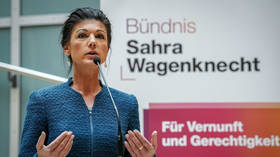
Attempts to prohibit the AfD, a growing thorn in the government’s side, are unlikely to work – and if they do, it’ll cause more harm than good

By Tarik Cyril Amar, a historian from Germany working at Koç University, Istanbul, on Russia, Ukraine, and Eastern Europe, the history of World War II, the cultural Cold War, and the politics of memory
By Tarik Cyril Amar, a historian from Germany working at Koç University, Istanbul, on Russia, Ukraine, and Eastern Europe, the history of World War II, the cultural Cold War, and the politics of memory
@tarikcyrilamartarikcyrilamar.substack.comtarikcyrilamar.com

FILE PHOTO: Tino Chrupalla and Alice Weidel, co-lead candidates for the Alternative for Germany (AfD) party, acknowledge supporters at an AfD campaign rally on August 10, 2021 in Schwerin, Germany. © Adam Berry / Getty Images
With really bad ideas, you can often ask two pertinent questions. First, why will it not work? Second, why would it be harmful if it did? That rule holds in Germany, where the really bad idea of banning the party Alternative für Deutschland (AfD) is currently getting much debate.
The background of this debate is simple. Founded a decade ago, the AfD has established itself as a lasting feature of the political landscape. A populist right-wing party (roughly comparable to, for instance, the Austrian FPÖ), it brings together politicians and voters across a spectrum of positions. In the AfD, this spectrum ranges from very solidly conservative to far right.
Still comparatively small, the AfD is significant. With currently just over 40,000 members, it holds 78 of 736 seats in the Bundestag, the central parliament in Berlin. Importantly, it is also well-represented in 14 of 16 regional parliaments, where it occupies 242 seats of 1898 (for all regional legislatures taken together). In terms of its impact on national debates, it clearly punches far above this quantitative weight.
Most importantly, however, the AfD is on a roll, on both the central and regional levels. If Germans were to vote for the Bundestag now – and thus in effect the chancellor’s office – the AfD would net 23%. That can be compared with the traditional center-left SPD, leading the hapless coalition government, at 14%. All parties from the ruling coalition (SPD, Greens, and the market-liberal FDP) together muster just 31% approval.

Read more
On the regional level, the picture is largely the same, with particularly pronounced AfD advances in the area of the former East Germany. For the Land of Brandenburg, for instance, a poll has the AfD in the lead with 28%, easily beating both the CDU mainstream conservatives (18%) and the SPD (17%). Adding insult to injury, AfD co-leader Tino Chrupalla is also surpassing the SPD’s Chancellor Olaf Scholz on the personal-popularity scale, which is admittedly a low bar, as Scholz has managed to become one of the most disliked German politicians ever.
No wonder that Germany’s under-qualified and somewhat hysterical minister of the economy, Robert Habeck, in whose head all of Russia seems to live rent-free, is publicly hallucinating that the AfD wants to make Germany like Russia. (The irony is, of course, is that with Habeck’s own mismanaged ministerial portfolio, quite a few Germans would welcome having Russia’s growth rates.)
Such rhetoric, as well as the timing of when the idea of an AfD ban is being floated, betrays the fact that the attempt to popularize the idea of outlawing the AfD is an opportunistic response to its increasing electoral clout, which of course cannot be openly admitted. So, those in favor of a ban argue that the AfD is an extremist party.
But crucially here, extremism has a specific, legally (and narrowly) defined meaning. According to the German Constitution (Article 21.2), the Constitutional Court (and only that court) can prohibit a party when it substantially endangers the constitutional order of the Federal Republic or its existence itself. An important and often overlooked caveat, is it is not enough for a party to display hostility to the constitutional order. A prohibition is only an option if the party does so in an “active-combative, aggressive manner,” as Germany’s Ministry of the Interior puts it.
Only two parties have ever been banned, a far-right one in 1952 and a far-left one in 1956. Other attempts to proscribe parties (or to be precise, the same party) have also failed twice: In 2003 and again in 2017, the Constitutional Court refused to outlaw the very far-right NPD (Nationaldemokratische Partei Deutschlands).
Here’s why trying to ban the AfD is a bad idea in the sense that it is unlikely to work:

Read more
In general, under the principle of Parteienprivileg (party privilege), German law fortunately makes it hard to prohibit parties. To satisfy both statutory law and interpretative precedent two key criteria must be met: A party must be proven to be fighting against Germany’s constitutional order and also to have a real chance of success.
The second criterion is why, in 2017, the Constitutional Court did not prohibit the NPD, although its program is openly extremist in a fascist register. Put simply, the Court found that the NPD is sufficiently mean but insufficiently important for a ban.
Considering the AfD, its opponents could of course argue that it has real influence and is going to have more. But the AfD’s enemies would still have a much harder time than with the NPD: While the NPD’s program is clear about policies that are principally irreconcilable with the German constitution, that is not the case with the AfD. In programmatic terms, it is a populist-right party (for which I, full disclosure, feel no sympathy) but it is not fundamentally challenging the German constitution. If a prohibition case were to rely exclusively on party programs, trying to ban the AfD would be hopeless.
Yet such cases also depend on another kind of evidence. To outlaw a political party requires a large body of incriminating material of the type that only security services can collect. To put it bluntly, before you can hope to get a party proscribed, you need to spy on it – a lot – and including by undercover agents inside that party. That is, by the way, the real relevance of German domestic security services (in the regional Länder and on the federal level) officially categorizing the AfD as, in essence, suspect. This classification says little about the chances of any prohibition procedure. What it really means is that the snoops can get to work.
It is this issue – the question whether the AfD is systematically lying about its real nature and intentions – that has made recent revelations about at least one secret meeting with other far-right representatives so resonant. Discussions there featured conspiratorial plans for expulsions, including of holders of German passports (euphemized as “remigration”), which runs directly counter to the constitution. Yet even such meetings, on their own, will not suffice for a ban.
But here too, there is a downside for the proponents of a prohibition attempt. If one of the three institutions (the parliament, the federal assembly, and the government) legally empowered to do so were to actually initiate a case with the Constitutional Court, then all undercover agents would have to be de-activated at once. Indeed, it was the fact that agents were still active inside the NPD that scuppered the first prohibition attempt against that party in 2003.
Now add the fact that such cases take years, and a paradoxical effect emerges. Starting the procedure would free the AfD from domestic security interference, at least officially, and in the sense that no evidence from any continuing spying could be used against it.
The fact that prohibition cases take so long to decide also means that there is no chance to deal with the current rise of the AfD through banning it. Any ban would be far too late to have an effect on, for instance, upcoming regional and federal elections. Indeed, if a prohibition case were initiated now, it would probably only allow the AfD to profit by playing the victim card.
And last but not least, there is another paradoxical effect of a prohibition attempt. If (when) it fails, in legal theory, the Constitutional Court will only find there is not enough evidence for a ban. But in political reality, the AfD would present such an outcome as proof that it is as clean as can be. Guess which story would be more resonant with the voters.

Read more
That brings us to the second angle under which trying to proscribe the AfD is a bad idea. In the improbable case of a successful prohibition, the ripple-on effects on German politics would be highly detrimental. For one thing, many voters would see the ban as foul play, an abuse of an emergency option to deal with a political competitor. And they would be right. Because even if we assume the worst about what the AfD really is and wants, we also have to apply the same skepticism to those who want to ban it and their motives.
Secondly, the issue is a textbook case of polarization. As a fresh poll shows, 42% of Germans would welcome initiating a banning case. How many are against it? Also 42%. Good luck.
Thirdly, those politicians who make up the AfD, and the voters who side with the party, would obviously not simply disappear. On the contrary, they would seek to reorganize and start over. And the experience of prohibition would only alienate them more from the political system. And since the AfD is not a small party with a minuscule number of voters, that effect would be especially detrimental.
Finally, the overall legitimacy – in the practical sense of principal acceptance by many citizens – of Germany’s remaining parties, in particular those having participated in a prohibition campaign against the AfD would decline further. Ironically, the very parties claiming to be fighting incipient authoritarianism, would be perceived not only as using authoritarian tactics but as doing so for selfish and dishonest purposes. And with good reason.
Is this a dilemma? Maybe. Can it be resolved by banning the AfD? No, definitely not.
The statements, views and opinions expressed in this column are solely those of the author and do not necessarily represent those of RT.




